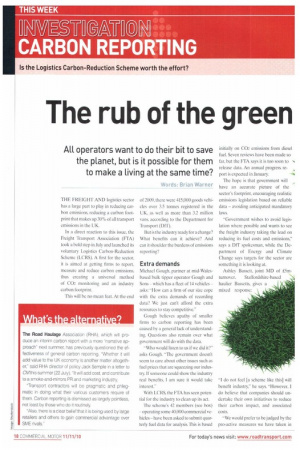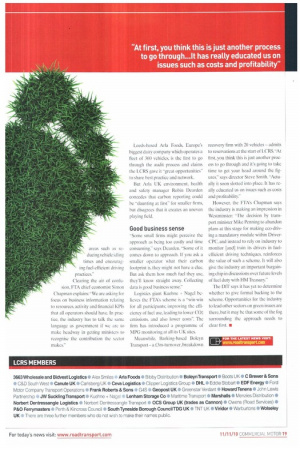The rub of the green
Page 18

Page 19

If you've noticed an error in this article please click here to report it so we can fix it.
All operators want to do their bit to save the planet, but is it possible for them to make a living at the same time?
Words: Brian Warner
THE FREIGHT AND logistics sector has a large part to play in reducing carbon emissions, reducing a carbon footprint that makes up 30% of all transport emissions in the UK.
In a direct reaction to this issue, the Freight Transport Association (FTA) took a bold step in July and launched its voluntary Logistics Carbon-Reduction Scheme (LCRS). A first for the sector, it is aimed at getting firms to report, measure and reduce carbon emissions, thus creating a universal method of CO2 monitoring and an industry carbon footprint.
This will be no mean feat. At the end
of 2009, there were 415,000 goods vehicles over 3.5 tonnes registered in the UK. as well as more than 3,2 million vans, according to the Department for Transport (DfT),
But is the industry ready for a change? What benefits can it achieve? And can it shoulder the burdens of emissions reporting'?
Extra demands
Michael Gough, partner at mid-Walesbased bulk tipper operator Gough and Sons which has a fleet of 14 vehicles asks: "How can a firm of our size cope with the extra demands of recording data? We just can't afford the extra resources to stay competitive."
Gough believes apathy of smaller firms to carbon reporting has been caused by a general lack of understanding. Questions also remain over what government will do with the data.
"Who would listen to us if we did it?" asks Gough. "The government doesn't seem to care about other issues such as fuel prices that are squeezing our industry. If someone could show the industry real benefits, I am sure it would take i nte rest.
With LCRS, the FTA has seen potential for the industry to clean up its act.
The scheme's 42 members (see box) operating some 40,000 commercial vehicles have been asked to submit quarterly fuel data for analysis. This is based initially on CO2 emissions from diesel fuel. Seven reviews have been made so far, but the FTA says it is too soon to release data. An annual progress report is expected in January The hope is that government will have an accurate picture of the sector's footprint, encouraging realistic emissions legislation based on reliable data avoiding anticipated mandatory laws.
"Government wishes to avoid legislation where possible and wants to see the freight industry taking the lead on reducing its fuel costs and emissions," says a DIE' spokesman, while the Department of Energy and Climate Change says targets for the sector are something it is looking at.
Ashley Bassett, joint MD of .£5m turnover, Staffordshire-based haulier Bassetts, gives a mixed response:
do not feel [a scheme like this] will benefit industry," he says. "However, I do believe that companies should undertake their own initiatives to reduce their carbon impact, and associated costs.
"We would prefer to be judged by the pro-active measures we have taken in
areas such as reducing vehicle idling times and encouraging fuel-efficient driving practices" Clearing the air of confusion, FTA chief economist Simon Chapman explains: "We are asking for focus on business information relating to resources, activity and financial KPIs that all operators should have. In practice, the industry has to talk the same language as government if we are to make headway in getting ministers to recognise the contribution the sector makes." Leeds-based Arla Foods, Europe's biggest dairy company which operates a fleet of 300 vehicles, is the first to go through the audit process and claims the LCRS gave it "great opportunities" to share best practice and network.
But Aria UK environment, health and safety manager Robin Dearden concedes that carbon reporting could he "daunting at first" for smaller firms, but disagrees that it creates an uneven playing field.
Good business sense
"Sonic small firms might perceive the approach as being too costly and time consuming." says Dearden. "Some of it comes down to approach. If you ask a smaller operator what their carbon footprint is, they might not have a clue. But ask them how much fuel they use, they'll know straight away Collecting data is good business sense."
Logistics giant Kuehne + Nagel believes the PTA's scheme is a "win-win for all participants; improving the efficiency of fuel use, leading to lower CO2 emissions, and also lower costs". The firm has introduced a programme of MPG monitoring at all its UK sites.
Meanwhile, Barking-based Boleyn Transport — a £3m-turnover, breakdown recovery firm with 20 vehicles — admits to reservations at the start of LCRS. "AL first, you think this is just another process to go through and it's going to take time to get your head around the figures," says director Steve Smith. "Actually it soon slotted into place. It has really educated us on issues such as costs and profitability."
However, the ETA's Chapman says the industry is making an impression in Westminster: "The decision by transport minister Mike Penning to abandon plans at this stage for making eco-driving a mandatory module within DriverCPC, and instead to rely on industry to monitor [and] train its drivers in fuelefficient driving techniques, reinforces the value of such a scheme. It will also give the industry an important bargaining chip in discussions over future levels of fuel duty with HM Treasury."
The Dir says it has yet to determine whether to give formal backing to the scheme. Opportunities for the industry to lead other sectors on green issues are there, but it may he that some of the fog surrounding the approach needs to clear first. •




























































































































